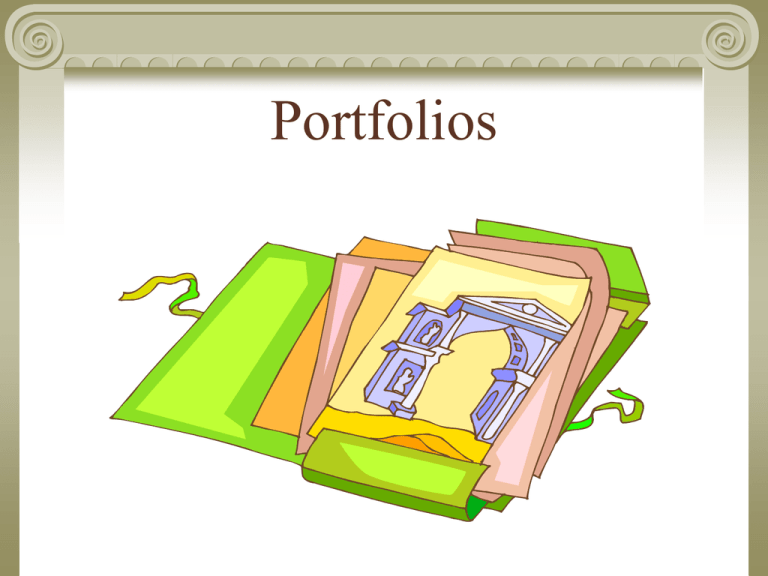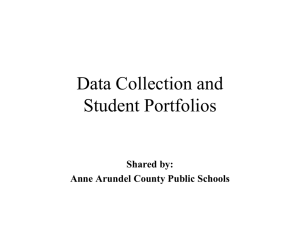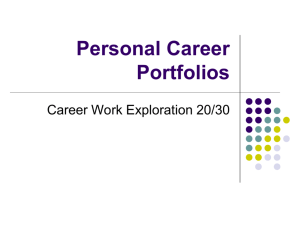PORTFOLIOS
advertisement

Portfolios Portfolios ULTIMATE GOAL: A portfolio should be something a student can take to job or college interviews. It serves as documentation of achievements and will be helpful to the student when filling out college and job applications in the years to come. Remember that your portfolio needs to be neat and to the point. Student portfolios should include Letter of introduction Application – documentation of learned skills Resume – student qualifications Academic skills (Project) – an entry from areas showcasing growth and knowledge with a reflection sheet Writing sample Work based learning Oral presentation Service learning Credentials Technology Leadership experience Letters of recommendation Letter of Introduction This letter serves as an introduction -telling the person who reads it who you are. It must be free of spelling and grammatical errors and should describe your career goals and other relevant information. Letter on Introduction Include your full name, address, and the date just as you would any formal business letter. Pay attention to having even top, bottom, left and right margins. DO NOT try to squeeze too much information on the page. This is an introduction - not your life history. Resume Professional resume to include educational and work experience, honors, awards and other activities. Styles of resumes may vary and can be found in many text books and on line. Be sure the resume is neat, printed on good quality paper, and one page in length. Project Health care knowledge/skills application project Awareness project or other activity that requires problem solving and hands-on application.. Writing Sample The ability to write effectively will be important to you in college and in a career. Students are asked to answer questions following instructions given. BE SURE the answers are clearly thought out and neatly handwritten. DO NOT use a computer! Work-based Learning This section includes a summary of 8 or more hours of a work-based learning experience or supervised practical experience such as job shadowing, career exploration, internship, and volunteering WORK-BASED LEARNING DO include the important facts - date, time, location, mentor(s) and what you did as part of the experience. NOTE: A letter from the agency in which the Student experienced a work-based learning environment may be used, provided the letter provides an appropriate description Oral Presentation Script of health-related speech and short description of who, where, what and when the speech took place. Must be a speech for school faculty, civic or community organization, local health care group, school classroom (any grade) or as part of a HOSA competitive event . Service Learning This is a one page summary of one or more service learning projects or activities to show the dates, hours, location, and learning outcomes DO use a chart or outline format. DO provide the dates, hours, location and learning outcomes. (What did you do? What did you learn from this experience?) Credentials This section includes up to five pages. Most students include a school transcript or recent report card. Also included can be copies of certificates or documentation that shows completion of training in health-related competencies Examples include and are not limited to: CPR certification, First Aid certificate, CNA, EMT, Foundation Standards assessments, etc. Technology Evidence of the use of technology beyond the basic skill level. Examples might be of something you created such as a web site, electronic newsletter, PowerPoint presentation, etc., OR other evidence of advanced technology skills (certificate, etc.). Leadership Experience In this section the student should list and describe his or her principal leadership activities in the approximate order of interest. These should include leadership roles in the arts, athletics, and organized school or community activities. Be sure to include dates and fit it all on one page. Student portfolios Letters of recommendation – show how others view a student Maintaining the portfolio Appearance – neat and clean Update – insert best work Evaluate – reflect on work collected in portfolio Replacement – insert new work displaying a greater skill mastery Benefits of the portfolio process Tangible proof of their knowledge and skills Students develop a sense of pride and ownership from collecting their best work Benefits Intangible self-assessment and self –esteem A portfolio provides future employers, scholarship committees or admission committees additional evaluation tools.




